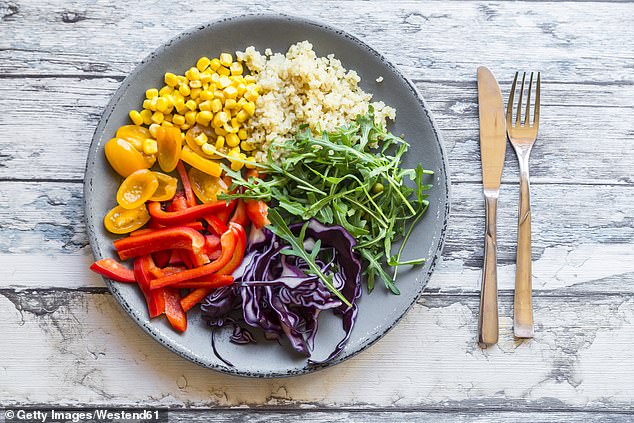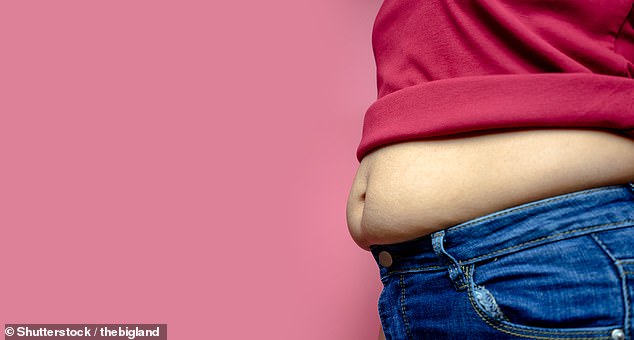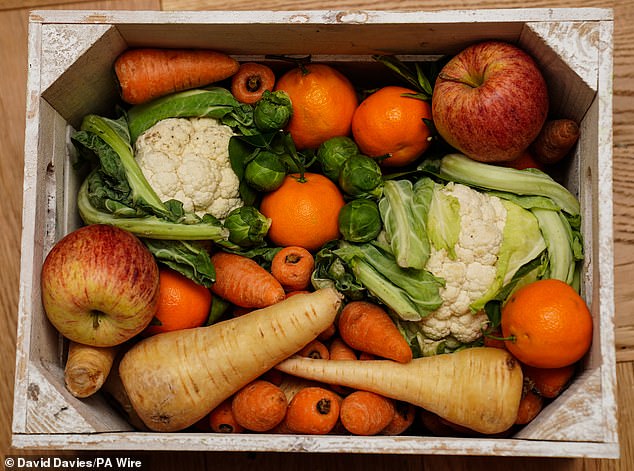Eating a vegan diet for just eight weeks can reduce a person’s biological age and help them lose weight, a study suggests.
Volunteers who limited themselves to plant-based foods also achieved decreases in heart, hormonal, liver, and inflammatory and metabolic system ages.
However, these changes were not seen in participants whose diet included meat, eggs and dairy products, according to researchers at Stanford University in California.
Those who followed a vegan diet throughout the study lost two kilograms more on average than those who did not.
However, this is likely because they consume 200 fewer calories per day in the meals provided during the first four weeks.
Experts say weight loss may have contributed to the observed differences in biological age between the two groups, rather than the nature of the food itself.
Following a vegan diet for just eight weeks can reduce a person’s biological age and help them lose weight (pictured: box of fresh fruit and vegetables)

Volunteers who limited themselves to plant-based foods also achieved decreases in heart, hormonal, liver, and inflammatory and metabolic systems (file photo)
Some suggest that in the long term, a vegan diet may lead to nutritional deficiencies and may not be suitable for all ages.
The findings, published in the journal BMC Medicine, are based on a small study of 21 pairs of 39-year-old identical twins, half of whom ate a vegan diet while the other sibling ate an omnivorous diet.
At the end of the study, researchers observed decreases in estimates of biological age based on levels of DNA methylation, a type of chemical modification to DNA used to estimate biological age.
Biological aging refers to the deterioration in the functioning of the body’s tissues and cells, as opposed to chronological age.
Previous research has reported that increased DNA methylation levels are associated with aging.
However, Varun Dwaraka of epigenetic testing company TruDiagnostic Inc. and Christopher Gardner of Stanford University in California and their colleagues said it’s not clear to what extent differences between peers can be attributed to differences in diet.
Further research is needed to investigate the relationship between diet, weight and aging, as well as the long-term effects of vegan diets, they add.
Tom Sanders, emeritus professor of nutrition and dietetics at King’s College London, who was not involved in the study, said the research found some differences in terms of ageing for vegans, but did not take into account the fact that vitamin and mineral deficiencies often take years to appear.
She added that research also suggests that a vegan diet may not be good for the health of older people.

Those who followed a vegan diet throughout the study lost two kilos more on average than those who did not, but this was probably because they consumed 200 fewer calories a day in the meals provided during the first four weeks (file photo)
Professor Sanders said: ‘Although observational studies indicate that vegan diets may have favourable health effects in midlife (such as a lower risk of cardiovascular disease and type 2 diabetes), this is not the case for older vegans who appear more likely to suffer from muscle loss, low bone density and neurological disorders that have a significant impact on quality of life.
‘In fact, life expectancy does not differ between vegans and those who opt for mixed diets.’
Dr Duane Mellor, a dietitian and spokesman for the British Dietetic Association, said that although the study compared a vegan diet with an omnivorous diet, these diets did not completely match in terms of calories.
He added: “It is possible that a reduction in energy intake could have potentially altered the way the participants’ DNA was modified.”
Dr Mellor noted that the vegan group was asked to eat twice as many portions of vegetables, more fruit and more legumes, nuts and seeds than the omnivore group, which could also partly explain the reported differences.

